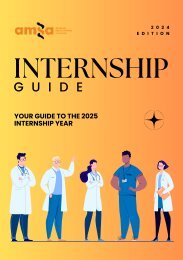The 2022 Starting Med Guide
Time truly flies. It's 2022, and we're welcoming another cohort of first-year students to medical schools across Australia. On behalf of your AMSA, we are so happy to have you! Throughout your degree, AMSA is here to support you at every turn. Whether you have a passion for advocacy or policy, global, rural, Indigenous or queer health, medical education, mental health, gender equity, national and international health politics, leadership, events or community, you will find opportunity for growth and discovery within AMSA. We understand that starting medicine can be daunting, and so our team has put together this guide to help you along the way. Enclosed within are tips and tricks, academic and study, career and networking advice, and available crisis and non-urgent support services.
Time truly flies. It's 2022, and we're welcoming another cohort of first-year students to medical schools across Australia.
On behalf of your AMSA, we are so happy to have you! Throughout your degree, AMSA is here to support you at every turn. Whether you have a passion for advocacy or policy, global, rural, Indigenous or queer health, medical education, mental health, gender equity, national and international health politics, leadership, events or community, you will find opportunity for growth and discovery within AMSA.
We understand that starting medicine can be daunting, and so our team has put together this guide to help you along the way. Enclosed within are tips and tricks, academic and study, career and networking advice, and available crisis and non-urgent support services.
You also want an ePaper? Increase the reach of your titles
YUMPU automatically turns print PDFs into web optimized ePapers that Google loves.
Tip #6: Earn money (and experience!)<br />
If you’re looking for a little more cash on the side, getting a job can be both rewarding and help<br />
you pick up a few new skills (especially that Aussie slang!). With your visa, you can work up to<br />
40 hours per fortnight during semester and as much as you want during breaks. Before<br />
starting work, you’ll need an Australian Tax File Number, and when applying for a job you’ll<br />
often have to submit a résumé (find templates online), and sometimes have to fill out an<br />
online form or attend an interview. Check if your university offers a job search, or you can<br />
search online through websites such as jobsearch.gov.au, seek.com.au, or careerone.com. au.<br />
You can find part-time work in many industries, such as tutoring, retail (stores and<br />
supermarkets), hospitality (waiting or hotels), babysitting, or whatever interests you! Do note<br />
that if you’re self-employed (e.g. working freelance jobs), you might need to apply for an<br />
Australian Business Number (ABN). You can check out https://www.abr.gov.au/businesssuper-funds-charities/applying-abn/abn-entitlement<br />
to find out more about whether you are<br />
eligible or whether you need to apply for an ABN.<br />
Tip #7: Your number one priority is your health<br />
Australia’s healthcare is rated amongst the highest in the world, and yet it can still be<br />
intimidating to seek for medical service in a foreign country. Despite this, do not hesitate to<br />
see a doctor when you need help! Learn about the coverage of your Overseas Student Health<br />
Cover (OSHC) and make full use of it! As well as visiting the doctor when things come up,<br />
remember to take care of your health through preventative measures as well.<br />
SLIP, SLOP, SLAP! Wear sunscreen, a hat, and sunnies when outdoors<br />
Try to maintain a balanced diet, and avoid the temptation of living off takeaway.<br />
While time can often be short as a medical student, exercise is important for maintaining<br />
nearly everywhere system in your body – join a sports team, gym, or just run around the<br />
local park. Try to avoid having more than 2 alcoholic drinks per day, and 4 on an occasion.<br />
If you don’t feel you’re coping, speak out. Tell your friends, look into some online resources<br />
(headspace.org.au is a great place to start), and if your university offers counselling<br />
services don’t be afraid to book in. It’s important to jump onto any problems before they<br />
start impacting your studies and living and looking out for your friends’ health too!<br />
Tip #8: Keep an eye on the Internship situation<br />
Your internship is your first-year practising as a doctor after med school. Internship spots<br />
available for international students can vary greatly from year to year depending on the cohort<br />
of medical students graduating. Keep your options broad and consider applying for<br />
internships interstate, overseas, and back home! <strong>The</strong>re are attempts to fix the problem, with<br />
an additional 100 internship positions promised by the Federal Government which would<br />
increase to 115 from 2020 onwards. <strong>The</strong> Federal Government has also increased the<br />
federally-funded internship positions to 115 from 2020. It is also important to keep updated<br />
with changes in the working visa requirements. In 2018, the old 457 visa has been replaced<br />
with the new 482 visa. Keep updated through channels like AMSA’s website and the ISN<br />
Facebook group.<br />
Tip #9: Know the important details<br />
In an emergency, call 000 (police, fire & ambulance) University security services – know their<br />
phone number, and note any emergency phones on campus Australian hotline for<br />
international students concerned about their welfare: 1300 363 079<br />
<br />
12

















